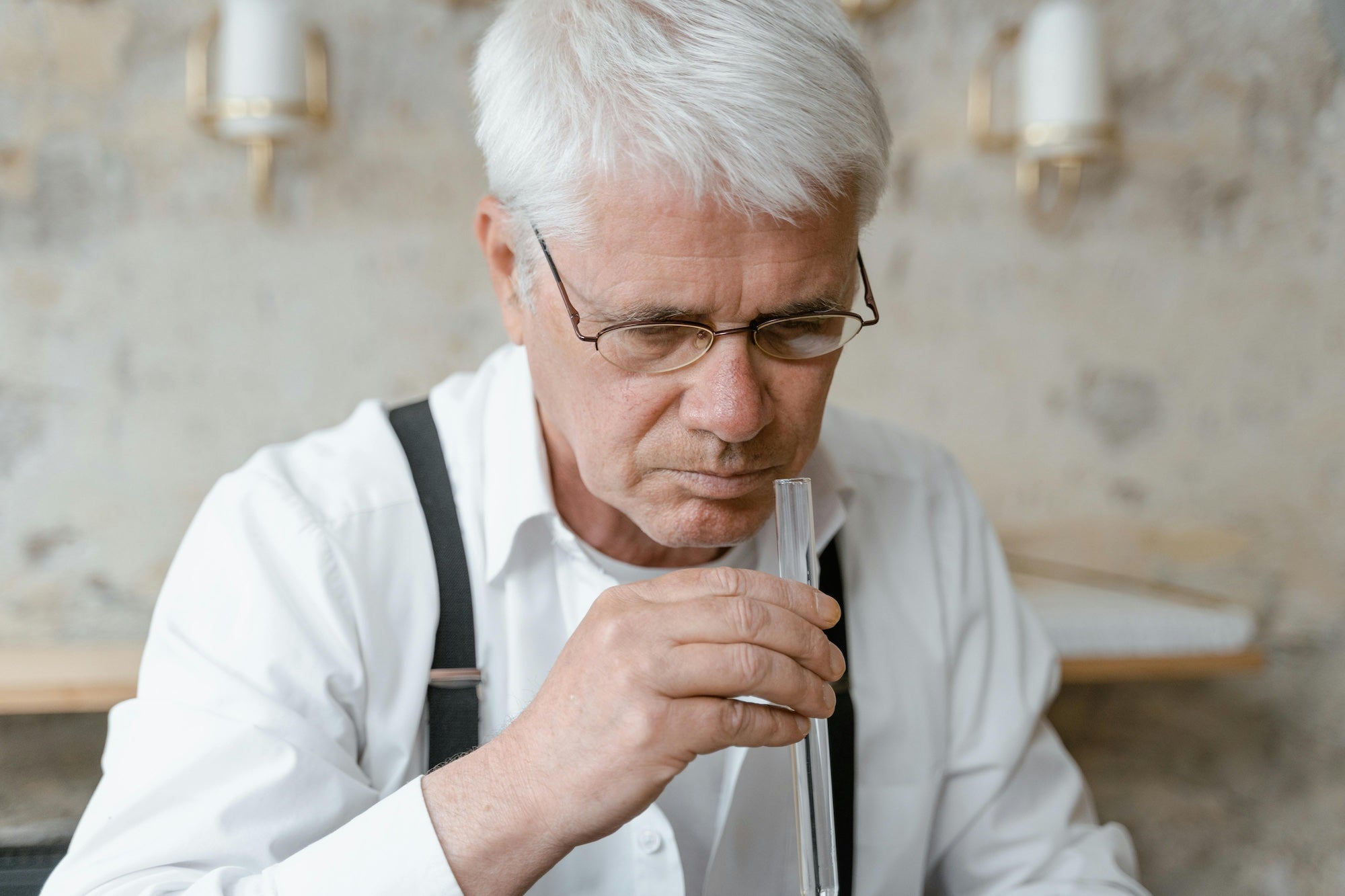Scent, a word with multiple meanings, evoking at the same time a pleasant smell, a captivating fragrance and a universe of refinement. More than a simple essence, perfume is a true expression of oneself, a secret language that tells a story, reveals a personality and underlines a style.
A journey through the ages
The history of perfume dates back to ancient times, when civilizations used scented oils and resins in religious ceremonies and rituals. Over the centuries, the art of perfumery has developed and refined, becoming an essential part of culture and beauty.

The essence of a perfume
Each perfume is a complex and unique composition, developed from a multitude of ingredients. The basis of any perfume is the olfactory pyramid, composed of three distinct notes:
- Top notes: They are the first impression of the perfume and evaporate quickly. They are usually composed of citrus, green or fruit notes.
- Heart notes: They are the soul of the perfume and are revealed after a few minutes. They are often floral, spicy or woody.
- Base notes: They bring depth and persistence to the perfume and can last for several hours. They are generally composed of musky, amber or vanilla notes.

An art with strict rules
Creating a perfume is a complex and demanding process that requires precise know-how and artistic talent. The perfumer, like a composer, orchestrates an olfactory symphony by carefully selecting and dosing each ingredient.
A range of fragrances
The world of perfume offers an infinite variety of scents for all tastes and occasions. There are several types of perfumes:
- Perfume (extract): The highest concentration of fragrance, offering exceptional hold and intensity.
- Eau de parfum: A medium concentration, ideal for daily use.
- Eau de toilette: A lighter concentration, perfect for more discreet use.
- Cologne: The lowest concentration, often used by men.
Olfactory Notes: The Key to the Language of Perfume
An olfactory journey
The fascinating world of perfume consists of a multitude of smells and scents. To better understand and appreciate them, it is important to know the olfactory notes, which form the basis of any perfume.
Definition and classification
An olfactory note is an odorous element that characterizes a fragrance. It can be natural, such as rose essence, or synthetic, such as C14 aldehyde. There are generally three categories of olfactory notes:
- Top notes: They are the first impression of the perfume and evaporate quickly. They are usually composed of citrus, green or fruit notes.
- Heart notes: They are the soul of the perfume and are revealed after a few minutes. They are often floral, spicy or woody.
- Base notes: They bring depth and persistence to the perfume and can last for several hours. They are generally composed of musky, amber or vanilla notes.
The harmony of notes
The creation of a perfume is a complex art that relies on the harmony of olfactory notes. The perfumer, like a composer, orchestrates an olfactory symphony by carefully selecting and dosing each ingredient.
The language of notes
Each olfactory note has its own characteristics and evokes different emotions and sensations.
- Floral notes: They evoke femininity, freshness and delicacy.
- Spicy notes: They bring warmth, dynamism and sensuality.
- Woody notes: They symbolize strength, virility and elegance.
- Musky notes: They provide softness, sensuality and comfort.
- Amber notes: They evoke warmth, orientalism and mystery.
- Vanilla notes: They bring deliciousness, roundness and tenderness.

Developing your sense of smell
Learning to identify olfactory notes is a valuable asset to better appreciate perfumes and choose those that match your tastes and personality.
- Exercise 1: Smell different fragrances and try to identify the dominant notes.
- Exercise 2: Compare two perfumes and analyze the differences and similarities between their olfactory notes.
- Exercise 3: Practice memorizing the smells of different raw materials (flowers, spices, wood, etc.).
A valuable tool
Knowledge of olfactory notes is a valuable tool for perfumers, perfume critics and fragrance lovers. It allows you to better understand the composition of a perfume, analyze its olfactory evolution and choose the perfumes that suit you best.
The art of the essay
Choosing a perfume is a personal and intimate experience. It is important to take the time to test different fragrances and let your emotions run free.
- Apply the perfume to warm areas of the body : wrists, neck, neckline.
- Let the scent develop and don't judge him immediately.
- Test several flavors and compare them before making your choice.
Perfuming your body: A delicate gesture
Perfume is worn with elegance and subtlety. It is important not to overuse it and to respect a few rules:
- Apply the perfume in small touches on pulse points.
- Do not rub the wrists after application.
- Perfume your clothes sparingly.
- Avoid perfume your hair and jewelry.

Seasonal harmony
The choice of a perfume can vary depending on the season and the event. In summer, we will favor light and fresh fragrances, while in winter, we will opt for more intense and warm perfumes.
Niche Perfumes: The Essence of Rarity
Niche perfumes are distinguished by their unique and exclusive character.They are made with rare and precious ingredients, and stand out from commercial perfumes for their originality and refinement.
A confidential universe
Niche perfumes are a world of their own, far from the beaten track of traditional perfumery. They are distinguished by their unique, exclusive and often avant-garde character. Born from the passion of daring creators, these perfumes explore unexplored olfactory territories and offer an extraordinary perfume experience.

Rarity and refinement
The very essence of niche perfumes lies in their rarity. Produced in small quantities, they stand out from commercial perfumes by their precious and exclusive character. The selection of raw materials is often rigorous, favoring rare and noble ingredients for an exceptional olfactory quality.
An innovation laboratory
Niche perfumers do not hesitate to break the codes and explore unexplored olfactory paths. They free themselves from conventions and experiment with new combinations, combining unexpected ingredients to create original and surprising fragrances.
A personal olfactory journey
Choosing a niche perfume is an intimate and personal experience. It is not simply about finding a pleasant scent, but about appropriating a unique creation that reflects one's personality and tastes. Each perfume tells a story, whispers an emotion and invites one to a personal olfactory journey.
Diversity and richness
The world of niche perfumes is an olfactory kaleidoscope, offering an infinite variety of scents for every taste and desire. From delicate floral fragrances to intense oriental scents, including woody and spicy notes, there is a niche perfume for every personality.
Accessible art
Contrary to popular belief, niche perfumes are not necessarily reserved for an elite. While some bottles can reach high prices, many brands offer excellent quality fragrances at affordable prices.
The rise of a community
Niche perfume lovers form a passionate and attentive community, sharing their discoveries and their favorites. Many blogs, forums and specialist boutiques help to raise awareness of this fascinating world and to democratize access to these unique fragrances.
Some examples of niche perfume houses
- Serge Lutens: A master of perfumery, known for his intense and daring creations.
- Annick Goutal: A French perfumer who has created a refined and elegant olfactory universe.
- Frederic Malle: A perfume publisher that offers collaborations with talented perfumers.
- The Artisan Perfumer: A French house that showcases exceptional natural raw materials.
- Orange Free State: A brand that shakes up the codes of perfumery with original and provocative fragrances.
- Byredo: A Swedish brand that offers minimalist and sophisticated perfumes.
- Xerjoff: An Italian house that combines tradition and innovation in its luxurious fragrances.
- Amouage: A brand from Oman that celebrates the opulence and sensuality of oriental fragrances.
- Francis Kurkdjian House: A talented perfumer who offers elegant and refined creations.
- The Lab: An American brand that offers unique and experimental fragrances.
Preserve your scent: Preserve the magic
Perfume is a delicate and precious creation that deserves to be preserved with care. By following a few simple steps, you can guarantee the longevity of your perfume and enjoy its fragrance intact for many years.
Light and heat: the sworn enemies of perfume
Light and heat are the two main factors that alter the quality of a perfume. The sun's ultraviolet rays degrade the odor molecules, while heat volatilizes them.

Storage tips
- Store your perfume in a cool, dry place away from direct sunlight. A shaded cupboard or a drawer in your dressing table is ideal.
- Avoid placing it in the bathroom, because ambient humidity can also damage it.
- Never keep your perfume in your car, because temperature variations can damage it.
- Choose bottles made of thick, opaque glass., which better protect the perfume from light.
- Close the bottle tightly after each use. to prevent the perfume from evaporating.
Tips to extend the life of your perfume
- Apply your perfume to pulse points such as wrists, neck and décolleté. Body heat will help diffuse the fragrance more evenly and lastingly.
- Do not rub your wrists after application. This can break down the scent molecules and alter the fragrance.
- Perfume your clothes sparingly. Wool and cotton retain odors particularly well.
- Use a refillable vaporizer to transfer your favorite perfume into a more travel-friendly format.

Managing Time: The Aging of Perfume
Even with the strictest storage advice, a perfume will eventually deteriorate over time. The lifespan of a perfume varies depending on its composition and concentration. On average, a perfume can be stored for between 2 and 5 years.
Signs Your Perfume Is Expired
- Color change : The fragrance may turn yellow or brown.
- Alteration of smell : The fragrance may become weaker, sour or unpleasant.
- Appearance of sediments : Small deposits may form at the bottom of the bottle.
Perfume: An invitation to travel
Perfume is more than just a smell, it is a universal language that touches the soul and emotion. It is an invitation

















